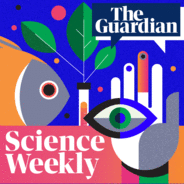Guardian science correspondents Linda Geddes, Nicola Davis and Hannah Devlin give Madeleine Finlay the lowdown on the Nobel Prizes for medicine, physics and chemistry that were announced this week. Help support our independent journalism at theguardian.com/sciencepod

Wissenschaft & Technik
Science Weekly Folgen
Twice a week, the Guardian brings you the latest science and environment news
Folgen von Science Weekly
299 Folgen
-
Folge vom 05.10.2023All the news and science from the Nobel Prizes
-
Folge vom 03.10.2023Everything you need to know about the menopauseMadeleine Finlay meets menopause expert Dr Louise Newson to find out about some of the myths surrounding the menopause, how women can prepare for this stage in life, and why information and support can be so difficult to access. Help support our independent journalism at theguardian.com/sciencepod
-
Folge vom 28.09.2023Could we end migraines for good?British minister Dehenna Davison recently resigned from government, explaining that chronic migraines were making it impossible for her to do her job. Her announcement coincided with a new drug for acute migraines being recommended for use in the NHS. Madeleine Finlay meets Prof Peter Goadsby, whose pioneering research underpins the new drug, to find out about the advances we’ve made in understanding migraines, and whether we might one day be able to wave goodbye to migraines for good. Help support our independent journalism at theguardian.com/sciencepod
-
Folge vom 26.09.2023Deja vu’s lesser-known opposite: why do we experience jamais vu?There’s a sensation many of us might have experienced: when something routine or recognisable suddenly feels strange and unfamiliar. It’s known as jamais vu, or ‘never seen’. Research into this odd feeling recently won an Ig Nobel prize, which is awarded to science that makes you laugh, then think. Ian Sample speaks to Ig Nobel recipient Dr Akira O’Connor about why he wanted to study jamais vu, what he thinks is happening in our brains, and what it could teach us about memory going right, and wrong. Help support our independent journalism at theguardian.com/sciencepod
